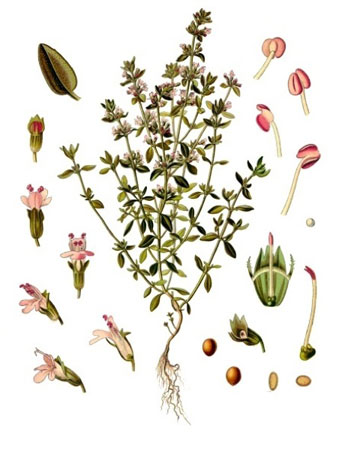Thymus vulgaris – Thymus vulgaris L.
A small half-shrub height of 25-40 cm, families gubotsvetnыh (Lamiaceae). The plant is widespread in the European part of Russia, in Siberia and Kazakhstan. Medical raw material is a herb thyme ordinary.

Thymus vulgaris – Chemical composition
The herb thyme contains essential oil with a predominance of phenols - thymol and carvacrol liquid. In small quantities in the essential oil found cymene, ʙorneol, pinene, terpynen, terpineol and other terpene compound, also found tannins, ursolic, Coffee, chlorogenic acid and oleanolic, flavonoidы, bitterness and mineral salts.
Thymus vulgaris – Pharmacological properties
Medicinal properties of thyme determined by the presence in it of essential oils, part of which is thymol, has a bactericidal effect on pathogenic coccal flora and bacteriostatic - Gram-negative bacteria. A high antimycotic activity and thymol against pathogenic fungi.
Galenic form of the herb thyme have pronounced expectorant, stimulate motor activity of ciliated epithelium of the upper respiratory tract and increase the amount of secretory discharge mucous membranes. Drugs thyme also contribute to loosening inflammatory attacks, thinning phlegm and accelerate its evacuation. In the dry mucous membranes of the throat and larynx thyme has enveloping effect. Due to the content in the plant and thymol carvacrol thyme herbal medicines are effective in inflammatory processes, complicated pathogens, Antibiotic Resistance. They adversely affect on L-form bacteria. Even with a negligible content of phenol compounds in the infusion preparation has a pronounced antimicrobial action. Besides, herb thyme possesses some inflammatory properties due to its content of flavonoids, that is of great importance in the mechanism of action of the plant expectorant.
Upon receipt of thyme into the enhanced secretion of gastric juice, inhibits the development of pathogenic organisms, cropped spasms of the gastrointestinal tract.
Thymus vulgaris – Use in medicine
The infusion and decoction of Thymus vulgaris (Creeping) often used for rinsing with inflammatory diseases of the oral cavity and oropharynx, caused by pyogenic bacteria. Galenic plant successfully prescribed for laryngitis, tracheitis, bronchitis and bronchopneumonia due antiseptic, expectorant, shielding properties, as well as the ability to enhance the secretion of bronchial glands, phlegm and accelerate the evacuation of the products of inflammation and mucous masses. Infusions and decoctions of plants widely used for cooking and medicinal baths as lotions, moist dressings for various skin diseases.
Successfully used drugs thyme and diseases of the gastrointestinal tract, accompanied by a reduction of gastric secretion, atony, or intestinal cramps, meteorizmom.
In appointing the drug from the herb thyme disappear in patients with abdominal pain, normalizes digestion, improving carminative. Besides, normal intestinal microflora by disinfecting properties of herbs thyme.
Effects - nausea - can occur mainly in the plant overdose. Drugs thyme contraindicated in pregnancy, cardiac decompensation, liver and kidney.
Thymus vulgaris – Formulations, Dosing and Administration
Infusion of herbs Thymus vulgaris: 10 g (2 Nightingale spoon) raw material is placed in an enamel bowl, Pour 200 ml (1 glass) hot boiled water, capped and heated in boiling water (in a water bath) 15 m, cooled at room temperature 45 m, filter, the remaining raw materials squeeze. The volume of the resulting infusion was adjusted with boiled water to 200 ml. The prepared infusion stored in a cool place no more than 2 d.
Take 1 tablespoon 2-3 times a day when you cough.
Grass stored in dry, cool place.
Decoction Thymus vulgaris prepared as follows:: taking the grass plants against 1:10, digested in 200 ml of boiling water, heated in a water bath for 30 m, cooled 10 min at room temperature, and take 1-2 tablespoons 3-5 times a day.
